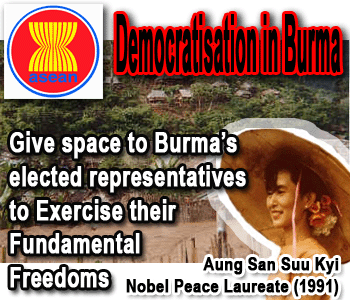The extension of the house arrest of Nobel Peace Prize laureate and Burmese pro-democracy leader Aung San Suu Kyi by the Myanmese military junta, which will keep her confined to her residence for a fifth straight year, must be condemned in all ASEAN, Asian and world capitals.
Myanmar’s membership in ASEAN must be seriously reviewed as the continued detention of Aung San Suu Kyi marks the abysmal failure of the 10-year ASEAN experiment to influence the Myanmar military junta to be a responsible member of international community when Myanmar was admitted into ASEAN as a member in 1997 in the teeth of regional and international opposition.
At that time, the rationale was that “constructive engagement” with the Myanmese military junta was the only option for ASEAN nations to influence Yangon and wean it from its ruthless and repressive form of dictatorship as it had proved to be completely impervious to regional and international opinion.
This year 2007 marks the ten-year membership of Myanmar in ASEAN, which is also to celebrate its 40th anniversary.
The blatant defiance of regional and international opinion urging the release of Aung San Suu Kyi, who had spent 11 of the past 17 years in detention, despite the unprecedented Open Letter by 59 former heads of state and government including former Malaysian Prime Minister, Tun Dr. Mahathir Mohamad, former Presidents in ASEAN like Corazon Aquino, Fidel Ramos, Abdurrahman Wahid, Megawati Sukarno is testimony that the Myanmar military junta is not prepared to make any concession to become a responsible member of the international community.
In the circumstances, the other ASEAN nations must seriously consider whether they should continue to allow Myanmar to be a millstone around the neck of ASEAN, bringing disrepute to the regional organization, or whether they should face up seriously to the option to suspend or expel Myanmar from ASEAN.

